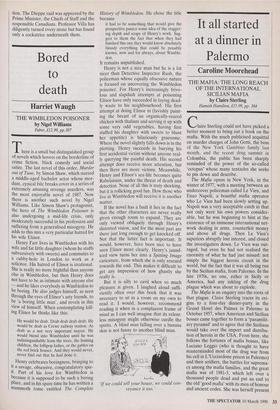Bored to death
Harriet Waugh
THE WIMBLEDON POISONER by Nigel Williams
Faber, £12.99, pp.307
There is a small but distinguished group of novels which hovers on the borderline of crime fiction, black comedy and social satire. The last novel of this order, Murder out of Tune, by Simon Shaw, which starred a middle-aged bachelor actor whose mor- dant, cynical bile breaks cover in a series of extremely amusing revenge murders, was the most enjoyable novel of 1987. Now there is another such novel by Nigel Williams. Like Simon Shaw's protagonist, the hero of The Wimbledon Poisoner is also undergoing a mid-life crisis, only moderately successful in his profession and suffering from a generalised misogyny. He adds to this mix a very particular hatred for his wife Elinor.
Henry Farr lives in Wimbledon with his wife and fat little daughter (whom he stuffs subversively with sweets) and commutes to a cubby-hole in London to work as a solicitor. His hatred of Elinor is irrational. She is really no more frightful than anyone else in Wimbledon, but then Henry does not have to be as intimate with anyone else — and he likes everybody in Wimbledon to be boring. He also judges himself, as seen through the eyes of Elinor's arty friends, to be 'a boring little man', and revels in this view of himself. When contemplating kill- ing Elinor he thinks like this:
He would be drab. Drab drab drab drab. He would be drab as Crewe railway station. As drab as a not very important mayor. He would blend into Wimbledon until he was indistinguishable from the trees, the homing children, the lollipop ladies, or the gables on the red brick houses. And they would never, never find out that he had done it.
Henry celebrates boringness, bringing to it a savage, obsessive, congratulatory spir- it. Part of his love for Wimbledon is because it is supposed to be such a boring place, and in his spare time he has written a mammoth tome entitled The Complete History of Wimbledon. He chose the title because
it had to be something that would give the prospective punter some idea of the stagger- ing depth and scope of Henry's work. Sug- gest to them the fact that when they had finished this one they would know absolutely bloody everything that could be possibly known, now and for always, about Wimble- don.
It remains unpublished.
Henry is not a nice man but he is a lot nicer than Detective Inspector Rush, the policeman whose equally obsessive nature is focused on uncovering the Wimbledon poisoner. For Henry's increasingly frivo- lous and slapdash attempts at poisoning Elinor have only succeeded in laying dead- ly waste to his neighbourhood. His first attempt at doing Elinor in (lavishly paint- ing the breast of an organically-reared chicken with thalium and serving it up with some very odd vegetables, having first stuffed his daughter with sweets to blunt her appetite) is hilariously gruesome. Where the novel slightly falls down is in the plotting. Henry succeeds in burying his first accidental victim without anyone real- ly querying the painful death. His second attempt does receive more attention, but then there are more victims. Meanwhile, Henry and Elinor's sex-life becomes quite Rabelaisian, under the threat of death and detection. None of all this is truly shocking, but it is rollicking good fun. How those who live in Wimbledon will receive it is another matter.
If the novel has a fault it lies in the fact that the other characters are never really given enough room to expand. They are only viewed obliquely through Henry's distorted vision, and for the most part are there just long enough to get knocked off. Not that the latter fact is important. It would, however, have been nice to have seen Elinor more clearly. Henry's jaund- iced view turns her into a Spitting Image caricature, from which she is only rescued towards the end. This makes it difficult to get any impression of how ghastly she really is.
But it is silly to cavil when so much pleasure is given. I laughed aloud suffi- ciently often over this book that it was necessary to sit in a room on my own to read it. I would, however, recommend reading it when in a complacent frame of mind as I can well imagine that its relent- less misogyny might otherwise curdle the spirits. A blind man falling over a banana skin is not funny to another blind man.
`If we could sell your house, we could con- veyance it too.'


























































 Previous page
Previous page